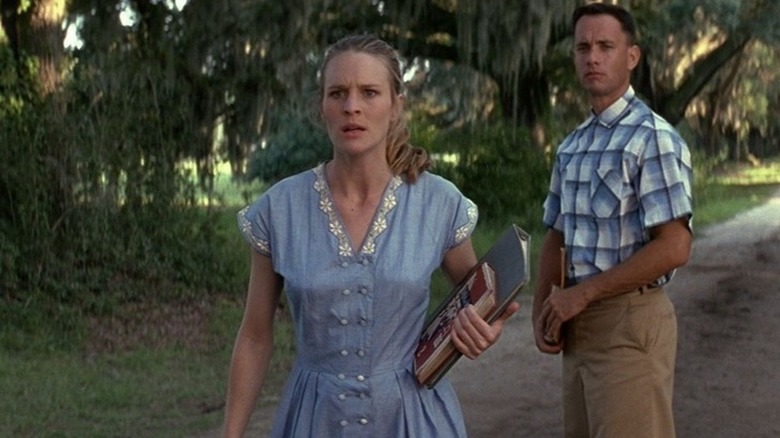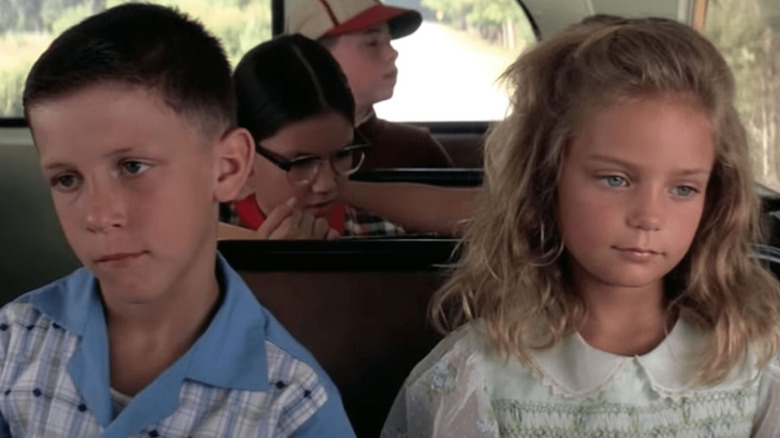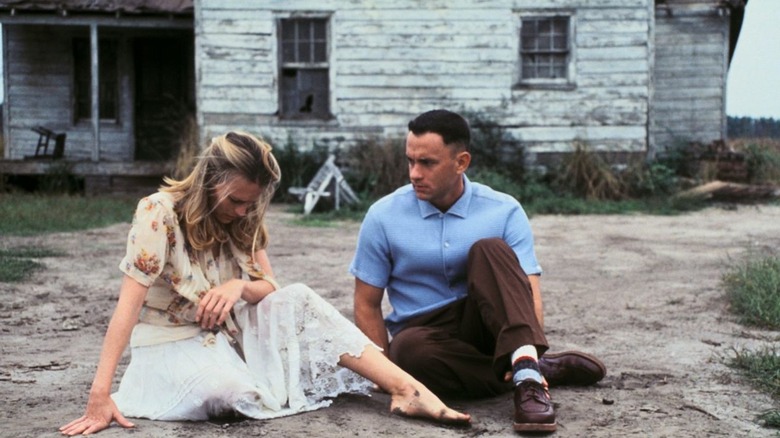Why Robin Wright Doesn't See Forrest Gump's Jenny As A Tragic Character
The following article includes allegations of domestic abuse and sexual assault.
Robin Wright gained critical acclaim for her performance in 1994's drama-comedy "Forrest Gump." In the film, Wright plays Jenny Curran, the elusive and highly coveted love interest of the titular character. Even though Wright couldn't have predicted the impact neither the movie nor her character would have on moviegoers, she told Entertainment Weekly in 2021 that while working onset she sensed something special happening. "When we were shooting it, we knew we were experiencing something special, and again, very original," Wright said. "And I just loved what [Robert] Zemeckis did with it. Because it's not overly sentimental and it could have been."
One of the most poignant qualities of Forrest Gump is his unconditional and never-dying love for Jenny despite her rejecting him and engaging in self-destructive behavior time and time again. Even though Forrest and Jenny's dynamic is frustrating at times, it's clear that Jenny's behaviors stem from deep-rooted trauma ... or maybe that isn't clear.
Is Jenny a lost soul?
In an interview with the LA Times in 1994, Robin Wright offered her interpretation of Jenny. "She's a lost soul who finds herself, but she is not a tragic figure, at least not more than any other girl going through her 20s and that catharsis," the "House of Cards" star said. "Maybe the difference is that we get to see her through every transformation over 30 years in a movie, as opposed to a therapy session."
I've meditated on and tried so hard to understand Wright's point of view, but I just can't brush off Jenny's life as one that is typical for any other 20-something-year-old girl who's been through what she has experienced. I don't believe Wright truly considered the sadness in how Jenny's upbringing and the sexual abuse she suffers at the hands of her own father as an innocent little girl (played by Hanna R. Hall ) shapes the poor decisions she makes as an adult that ultimately leads to her early demise. Jenny's life, by definition, is a Shakespearean tragedy.
I understand it's common for people to enter adulthood with baggage and simply not be ready for the world. Some enroll in college, and switch majors every semester only to realize school just isn't for them. They drop out and idle through society hoping to find that one thing that truly ignite that spark within them. Some experiment with drugs. They may also explore their sexuality before they find their true loves. In that regard, Jenny is no different as we see her jump from being a "Playboy" model, to nude nightclub folk singer, to anti-war activist and ally of the Black Panther and the hippie counterculture movements.
But her soul is more than just lost
On the surface, Jenny appears to be a young lost woman searching to find herself. But when I consider the context of her upbringing, particularly the abuse from her father, I begin to hone in on her promiscuity and the series of toxic, drug-ridden relationships she finds herself in with abusive men. I see a traumatized woman struggling to reconcile with what her dad had done to her. This point is further illustrated by the scenes in which Jenny teases jumping off a bridge in front of Forrest and later comes just an inch from leaping to her death from a high-rise hotel balcony. Contrary to Robin Wright's interpretation, Jenny is no lost soul; she's a tortured soul. This is further expounded when Jenny breaks down as she vandalizes her childhood home where the abuse took place.
Wright also said Jenny eventually finds herself, but I'm not sure if that's the case either. Yes, Jenny begins to recover from her drug addiction, finds steady employment as a waitress and decides to marry Forrest Gump so the couple could live together with their son, but it doesn't appear to be an organic progression as her actions seem motivated by the revelation that she has a deadly virus (which I presume to be AIDS) and not by her discovering herself per se. I also presume that she contracts the deadly virus that leads to her early death by engaging in the self-destructive behaviors spawned by her childhood trauma. When taking all of this into account and thinking about all the possibilities of what could have been of Jenny's life if only she didn't have the misfortune of having the father she had, it's hard to not identify Jenny as a tragic character.
If you or someone you know is dealing with domestic abuse, you can call the National Domestic Violence Hotline at 1−800−799−7233. You can also find more information, resources, and support at their website.


